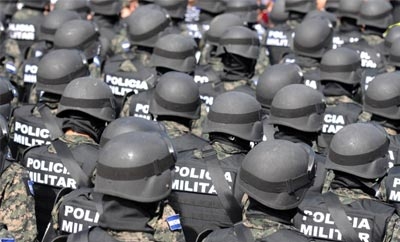For many citizens, corruption is associated with state institutions and, above all, with the institutions that have the responsibility of providing security: the police.
Around 31 percent of Latin Americans say corruption is the main problem police face in their efforts to combat crime, according to research (pdf). According to 2013’s Global Corruption Barometer, which polled 107 countries around the world, only political parties are seen as more institutionally corrupt than police and almost a third of people polled confessed to having bribed an official of the law.
This article originally appeared on the Inter-American Development Bank’s blog Sin Miedos. See original article here.
Controlling police corruption is not easy. On one side, the police need to be granted a degree of discretion to be able to act quickly and opportunely, especially when a crime is taking place. On the other side, they come into contact with lucrative criminal activities, which heightens the risk of corruption. On top of this there is a tradition of reluctance when it comes to systems of internal controls, transparency and public scrutiny, added to an esprit de corps that creates a wall of silence around possible failings.
SEE ALSO: Coverage of Police Reform
Aside from creating anxiety among citizens, police corruption is also a reflection of institutional weakness. In many cases in Latin America, such weakness stem from the creation of these institutions, but even more stem from the institutional backwardness of the institutions when compared to the levels of responsibility expected of them when it comes to protecting the rights and freedoms of citizens. It is in this sense that strengthening institutions contributes to combating corruption. To do this there are three lines of action that have been shown to be effective:
1: Human resources policies for new police should be more demanding, requiring a greater level of background checks into criminal records of the applicant and their family environment, and more rigorous entrance exams. The police career should be structured in all phases — entrance, development and retirement — around concrete objectives and results, with a transparent and competitive system of promotions. There should be professionalization and training programs covering distinct specialties, complemented by integrated and permanent pedagogical training that includes themes such as democracy, human rights, and ethical behavior standards. This should also be accompanied by pay schemes that guarantee a minimum standard of living for the official and his/her nuclear family.
2: The importance of strengthening capacity for prevention and investigation is one of the lessons learned from the police reforms of Hong Kong and New York. Control of dealing with corruption cannot be left in the hands of police when it comes to their own institution — there needs to be an independent body, under civilian control and with mixed police and civilian teams. These bodies develop preventive strategies to correct systemic failures that encourage corrupt practices, such as role playing situations in which agents that are subjects of investigations are presented with an opportunity to act in a corrupt way. This independent body can also carry out investigations into cases of corruption or physical abuse and administer punishments.
3: It is important to further political and social control, including parliamentary committees, oversight and political leadership from the government. This should be combined with a policy of rapprochement with civil society to generate greater accountability in order to restore confidence and generate the necessary support for institutional reforms. One example of success in this area is the British police, who routinely respond to requests for information and participate in meetings or talks with different sectors of society in order to respond to questions and evaluate the implementation of various programs.
No police force is free from the risk of corruption. Nevertheless, police reform processes with an integrated focus help minimize this risk as there is political leadership, policy guidance, inter-institutional coordination and commitment articulated by the authorities from the security sector.
*Nicolas Dassen is a modernization specialist at the Inter-American Development Bank (IDB). This article first appeared on the IDB blog Sin Miedos. It was translated and republished with permission. See the original here.

